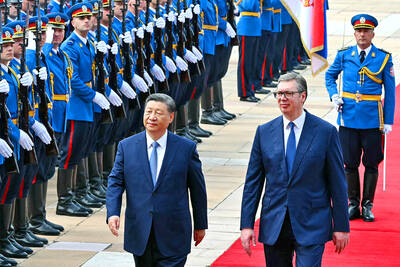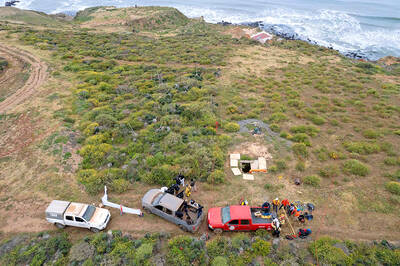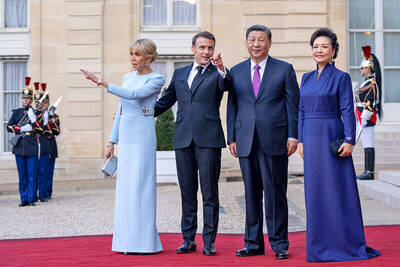US president-elect Joe Biden should look to develop an “overall constructive relationship” with China following “quite a tumultuous ride” over the past four years, Singaporean Prime Minister Lee Hsien Loong (李顯龍) said in an interview.
A new framework between the nations would allow both countries “to develop the areas of common interest, and constrain the areas of disagreement” on issues such as trade, security, climate change, North Korea and non-proliferation, Lee said in an interview with Bloomberg editor-in-chief John Micklethwait at the New Economy Forum.
Singapore’s leader also rejected any attempt to divide nations “Cold War-style.”
“We all want to work together with the US, we all want to work together with other vibrant economies, we would like to cooperate within the region,” said Lee, who has already offered his congratulations to Biden.
“I think not very many countries would like to join basically a coalition against those who have been excluded, chief of whom will be China,” he said.
Lee has been one of the most vocal global leaders calling for the world’s biggest economies to avoid a destructive clash that could force smaller countries like Singapore to choose sides on everything from trade and technology to COVID-19 vaccines and territorial disputes in the South China Sea.
A city-state dependent on trade, Singapore supports a strong US presence in Asia by allowing the US to use its military facilities while also counting China as its top trading partner.
Lee said while Beijing does not want a “collision” with the US, Chinese officials might not be prepared to cede much ground.
At the same time, US President Donald Trump’s “America first” view of the world has changed perceptions both within the US and overseas about how broadly the world’s predominant superpower has an interest in maintaining global stability, he said.
“It will take some time I think for America to come back to such a position and for others to be convinced that it is taking such a position,” Lee said.
“It may never come back all the way, certainly in the short term and certainly in terms of its relations with China,” he added.
Citing the punitive tariffs Trump placed on China that were maintained in the “phase one” trade deal reached in January, Lee said it would be difficult for any successive US administration to take them away.
“There’s some elements in the administration who definitely did want to make moves which would be very difficult to reverse by the subsequent administration, and which will set the tone for the relationship for a long time to come,” Lee said.
Singapore was among countries that resisted US pressure to ban China’s Huawei Technologies Co from its 5G networks, with its regulator letting telecoms decide which vendors to choose. They ended up picking Huawei rivals Ericsson and Nokia to be their main 5G network providers.
“If I say I want absolute security, that’s not to be had in this world,” Lee said.
He also said that anti-China sentiment in the US has gained deep bipartisan support beyond Trump.
“The consensus to see China as a strategic threat is almost becoming received wisdom and unquestionable in the US,” Lee said. “And so it will be very difficult for any administration, whether it’s Biden or on the outside chance, Trump, to disregard that and just proceed as if the last few years had not taken place.”

MONEY MATTERS: Xi was to highlight projects such as a new high-speed railway between Belgrade and Budapest, as Serbia is entirely open to Chinese trade and investment Serbian President Aleksandar Vucic yesterday said that “Taiwan is China” as he made a speech welcoming Chinese President Xi Jinping (習近平) to Belgrade, state broadcaster Radio Television of Serbia (RTS) said. “We have a clear and simple position regarding Chinese territorial integrity,” he told a crowd outside the government offices while Xi applauded him. “Yes, Taiwan is China.” Xi landed in Belgrade on Tuesday night on the second leg of his European tour, and was greeted by Vucic and most government ministers. Xi had just completed a two-day trip to France, where he held talks with French President Emmanuel Macron as the

With the midday sun blazing, an experimental orange and white F-16 fighter jet launched with a familiar roar that is a hallmark of US airpower, but the aerial combat that followed was unlike any other: This F-16 was controlled by artificial intelligence (AI), not a human pilot, and riding in the front seat was US Secretary of the Air Force Frank Kendall. AI marks one of the biggest advances in military aviation since the introduction of stealth in the early 1990s, and the US Air Force has aggressively leaned in. Even though the technology is not fully developed, the service is planning

INTERNATIONAL PROBE: Australian and US authorities were helping coordinate the investigation of the case, which follows the 2015 murder of Australian surfers in Mexico Three bodies were found in Mexico’s Baja California state, the FBI said on Friday, days after two Australians and an American went missing during a surfing trip in an area hit by cartel violence. Authorities used a pulley system to hoist what appeared to be lifeless bodies covered in mud from a shaft on a cliff high above the Pacific. “We confirm there were three individuals found deceased in Santo Tomas, Baja California,” a statement from the FBI’s office in San Diego, California, said without providing the identities of the victims. Australian brothers Jake and Callum Robinson and their American friend Jack Carter

CUSTOMS DUTIES: France’s cognac industry was closely watching the talks, fearing that an anti-dumping investigation opened by China is retaliation for trade tensions French President Emmanuel Macron yesterday hosted Chinese President Xi Jinping (習近平) at one of his beloved childhood haunts in the Pyrenees, seeking to press a message to Beijing not to support Russia’s war against Ukraine and to accept fairer trade. The first day of Xi’s state visit to France, his first to Europe since 2019, saw respectful, but sometimes robust exchanges between the two men during a succession of talks on Monday. Macron, joined initially by EU Commission President Ursula von der Leyen, urged Xi not to allow the export of any technology that could be used by Russia in its invasion